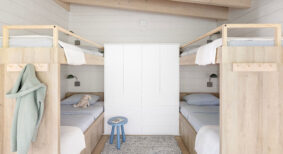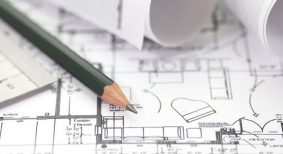Completion of Vancouver’s first modular housing development at 220 Terminal Avenue was celebrated in late February. The innovative project helps to address the affordable housing problems in the city, providing interim homes for 40 male and female residents on low-and fixed-incomes.
The 14,875 square foot building features 40 single occupancy suites with self-contained bathrooms and kitchens, individual climate control, and private living space. The central building features include indoor and outdoor amenity space, central laundry, and a number of wheelchair accessible suites on the first floor.
Through use of innovative design ideas and products, the building can be relocated and reconfigured to fit a number of different sites, even the foundation system is reusable. The unique design allows the temporary modular homes to be relocated to future sites.
The project also features two murals on the outside of the building. Braken Hanuse-Corlett, a mural artist and a member of a the Wuikinuxv and Klahoose Nations created the work to reflect the history of the area.
Modular housing manufacturer Horizon North started construction of the modular building in September 2016. The total capital costs for the project were $3 million.
The City of Vancouver donated undeveloped, city-owned land to the Vancouver Affordable Housing Agency (VAHA) for this project. Placing modular housing on vacant and underutilized sites pending redevelopment is a cost-effective way to quickly increase the supply of affordable housing until more permanent housing can be built.
Funding to support VAHA’s temporary modular housing development also comes from the Government of Canada, Vancity and a private donation.
“There’s an immediate need for modular housing to support people on very low incomes who can’t find a place to live as we continue to grapple with a homelessness crisis,” said Mayor Gregor Robertson. “This modular housing development is an innovative, low-cost solution that quickly delivers affordable housing by utilizing vacant city land as we wait for more permanent social housing to be built.”







